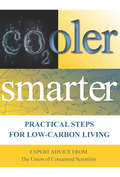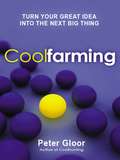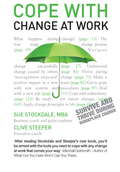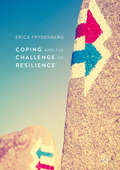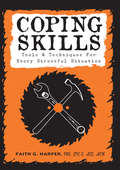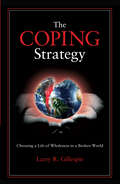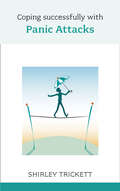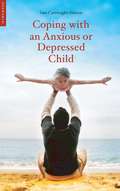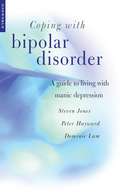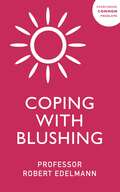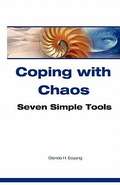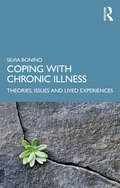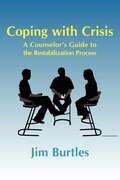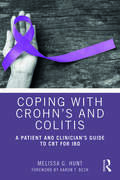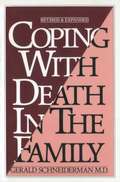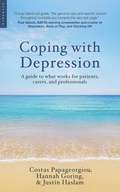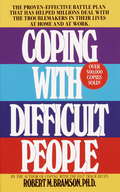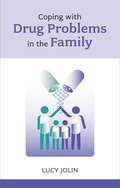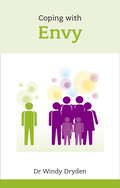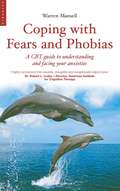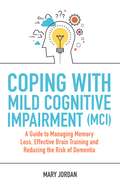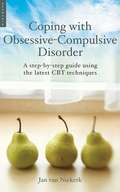- Table View
- List View
Cooler Smarter: Practical Steps for Low-Carbon Living
by David Friedman Seth Shulman The Union of Concerned Scientists Margaret Mellon Jeff Deyette Brenda EkwurzelHow can each of us live Cooler Smarter? While the routine decisions that shape our days--what to have for dinner, where to shop, how to get to work--may seem small, collectively they have a big effect on global warming. But which changes in our lifestyles might make the biggest difference to the climate? This science-based guide shows you the most effective ways to cut your own global warming emissions by twenty percent or more, and explains why your individual contribution is so vital to addressing this global problem. Cooler Smarter is based on an in-depth, two-year study by the experts at The Union of Concerned Scientists. While other green guides suggest an array of tips, Cooler Smarter offers proven strategies to cut carbon, with chapters on transportation, home energy use, diet, personal consumption, as well as how best to influence your workplace, your community, and elected officials. The book explains how to make the biggest impact and when not to sweat the small stuff. It also turns many eco-myths on their head, like the importance of locally produced food or the superiority of all hybrid cars. The advice in Cooler Smarter can help save you money and live healthier. But its central purpose is to empower you, through low carbon-living, to confront one of society's greatest threats.
Coolfarming: Turn Your Great Idea into the Next Big Thing
by Peter GloorPursuing new ideas is clearly the way to gain business advantage in the new millennium. But it's not enough to simply chase after ideas that have already happened. To truly benefit, individuals and organizations have to foster the new creative impulses around them. Coolfarming shows readers how they, like bee keepers, can nurture exciting trends and unleash their creative swarm's output of "next big ideas." Featuring real life examples from Linux to Twilight, from Procter Gamble to Apple, Coolfarming provides readers with invaluable insight on how to: Provide a fertile nurturing ground for developing original ideas * Determine what "cool" means for one's target group, and what attributes the next big thing should possess * Convert creative dreams into real products by enlisting the help of a dedicated and passionate Collaborative Innovation Network * Carry new ideas over the tipping point into widespread phenomena Those who want to stay ahead of the curve and ride a wave of profit need to learn how to find, develop, and popularize the trends of tomorrow. Coolfarming is the answer.
Cope with Change at Work: A practical, positive companion for dealing with organisational change
by Sue StockdaleIn these turbulent economic times it seems that change is now, ironically, the only constant. If you have found that your job has changed (or been lost) in ways that you cannot control, then this is the book for you. Whether it's your manager, your job, your employment status, your working style, or your industry that's changing, this book is full of practical tips. And it's not written just for managers either - this book is written for people who are going through change, rather than those who are trying to implement it.
Coping and the Challenge of Resilience
by Erica FrydenbergThis book addresses how best to meet everyday challenges. The author focuses on how to think and act differently about what we do as we face challenges, and how to assess each situation as one of challenge rather than threat or harm because we have the strategies to cope. Spanning eleven chapters, the book examines the best ways to provide the core skills for life, to children, adolescents and adults, and how that is best achieved through the contemporary theories of coping. Coping has traditionally been defined in terms of reaction; that is, how people respond after or during a stressful event. More recently, coping is being defined more broadly to include anticipatory, preventive and proactive coping. This book provides case studies of resilient adults in a range of settings, highlighting how coping resources have helped them to overcome adversity. Researchers, students of psychology and social work, practitioners and those interested in the self-help field will find this book invaluable.
Coping Skills: Tools & Techniques for Every Stressful Situation
by Faith G. Harper, PhD, LPC-S, ACS, ACNYou know those days when you just can't even? When everything is haywire and everyone, including yourself, seems to be against you, not to mention against reason? Your to-do list is a mile long, your kid is sick, traffic sucks, and you just spilled coffee all over yourself as you were about to walk out the door? How do you cope? Most of us don't have great coping skills, and turn instead to addictions, zoning out, or freaking out. Dr. Faith, author of the bestselling Unfuck Your Brain, offers a range of healthier strategies for getting through tough moments, gaining perspective, and shifting your attitude.This book teaches you different strategies for different types of situations, and includes skills from many methodologies, including CBT, DBT, ACT, Positive Psychology, Mindfulness-based Stress Reduction, Somatic Experiencing, Jungian therapy, and more.
The Coping Strategy: Choosing a Life of Wholeness in a Broken World
by Larry R. GillespieA retired psychologist shares his life-management strategy that empowers you to cope with problems while gaining joy, meaning, and purpose in life. There are matters in life that are broken, consume our energies, and lead us to feeling stressed out, if not burned out. But what if it were possible to embrace a life of wholeness in our broken world? What if there were basic keys to boundless freedom and opportunity—keys anchored upon treasured sacred writings, time-honored philosophical wisdom, and modern psychology? And what if these keys could be incorporated into a powerful, transformative life-management strategy that is easy to understand? There is a method that has proven effects in this endeavor. In The COPING Strategy, you will learn to apply the principles of this system, sharing them with friends, family, and others who are important to you. The strategy spelled out within the pages of this book will help you to embrace the power of Choice, the power of Overcoming, the power of Pause, the power of Initiation, the power of Negating Negative thinking, and the power of Giving. It can help you enhance your physical well-being, experience a joy that transcends circumstances, and anchor your life in meaning and purpose. Welcome to a life of wholeness in a broken world!
Coping Successfully with Panic Attacks
by Shirley TrickettPanic attacks happen when the body's emergency button is being pressed continuously. Breathlessness, chest pains, sweating, shaking, dizziness and fainting are all among the symptoms, and the experience can be terrifying. Fluctuating blood-sugar levels, anxiety and exhausted nerves affecting muscle tension and breathing can all cause panic attacks. This book explains how to stop pressing the panic button. Shirley Trickett shows how to understand your inner self, and overcome panic attacks with a balanced approach to meet your physical and emotional needs.
Coping with an Anxious or Depressed Child: A CBT Guide for Parents and Children (Coping With (oneworld) Ser.)
by Samantha Cartwright-HattonDoes your child suffer from anxiety or depression? Are you at a loss as to what to do about it? This navigational tool, written by eminent clinical psychologist Sam Cartwright-Hatton, will tell you how to give your child the best chance of recovery, as well as offer insight into the often complicated systems of mental healthcare.
Coping with Bipolar Disorder: A CBT-Informed Guide to Living with Manic Depression (Coping With...)
by Steven Jones Peter Hayward Dominic LamFully updated and revised, this new edition of Coping with Bipolar Disorder draws on the combined expertise of three leading specialists to offer a comprehensive and practical guide to the causes, treatment, and implications of bipolar disorder, or manic depression. Designed for people with the condition and those close to them, the authors use cognitive behavioural therapy to provide straightforward help with managing and controlling the condition, featuring advice on such key areas as mood monitoring; managing money; housing and social support; and sustaining happy relationships. With real-life case studies, helpful chapter summaries and a full list of support organizations and web groups, this guide will both inform and empower all those who live with the bewildering turbulence of bipolar disorder. Steven Jones is Senior Lecturer in Clinical Psychology at the University of Manchester. Peter Hayward is a Consultant Clinical Psychologist at the South London and Maudsley NHS Trust on in London. Dominic Lam is a Senior Lecturer in Clinical Psychology at the Institute of Psychiatry
Coping with Blushing
by Robert Edelmann Robert J. Edelmann'I just couldn't stop blushing... It was awful!' It's the thing you dread most. You're at a party, giving a presentation, joining a new evening class or even meeting your online date in real life for the first time. You feel the warmth creeping up over their face - you know they've noticed, and now they'll think you're socially inept, or awkward, or nervous. The more embarrassed you feel, the more you blush.But it doesn't need to be this way. Blushing is not something to be feared, and there are ways to break the cycle and regain control of your anxiety. Professor Edelmann offers proven, practical and easy to manage strategies to unlearn feelings of failure, and to not only survive but thrive in any social or professional situation.
Coping with Blushing
by Robert Edelmann Robert J. Edelmann'I just couldn't stop blushing... It was awful!' It's the thing you dread most. You're at a party, giving a presentation, joining a new evening class or even meeting your online date in real life for the first time. You feel the warmth creeping up over their face - you know they've noticed, and now they'll think you're socially inept, or awkward, or nervous. The more embarrassed you feel, the more you blush.But it doesn't need to be this way. Blushing is not something to be feared, and there are ways to break the cycle and regain control of your anxiety. Professor Edelmann offers proven, practical and easy to manage strategies to unlearn feelings of failure, and to not only survive but thrive in any social or professional situation.
Coping with Chaos: Seven Simple Tools
by Glenda H. EoyangAre you faced with rapid change, unexpected consequences, and unpleasant surprises? You're not alone. In these times of massive interdependence, economic disruption, technological transformation, and globalization, traditional tools and techniques often magnify or mask problems rather than solving them. <P><P>This book is a down-to-earth, practical introduction to human systems dynamics-where complexity science meets organizational practice. These simple ideas are far from simplistic! You can use insights from Coping with Chaos to: * recognize chaotic patterns * use the energy of chaos for positive change * apply lessons to stories and case studies Who should read this book? Anyone who wrestles with unpredictable and uncontrollable people challenges. OD practitioners will find it a powerful aid in seeing and influencing client systems. Supervisors and managers will see ways to understand and shape employee performance. All will see new ways to deal with old problems.
Coping with Chronic Illness: Theories, Issues and Lived Experiences
by Silvia BoninoThis valuable book combines psychological theories of health with the lived experience of coping with chronic health conditions, focusing on the "ill person" as an actor of their own development. It draws on perspectives from developmental and health psychology alongside the author’s personal experience of chronic illness. Bonino considers all aspects of living with illness, from issues that impact on everyday functioning such as pain and fatigue, to the rebuilding of identity through meaningful new goals and effective actions, and the development of therapeutic relationships. Psychological theories are interweaved with descriptions of lived encounters to center the experience of the person living alongside illness and provide insightful points of reference that everyone could try to use when facing the challenges of chronic disease in the course of their daily lives. Coping with Chronic Illness is important reading for those living with chronic health conditions, as well as for healthcare professionals looking to gain awareness of the psychological issues caused by living with illness. It is also of interest for postgraduate students of health psychology.
Coping With Crisis: A Counselor's Guide to the Restabilization Process
by Jim BurtlesIn the wake of a catastrophic event, the witness may discover or experience unsettling emotions which can trigger subsequent behaviors. These reactions can lead to a number of consequences, some of which are unproductive.
Coping with Crohn’s and Colitis: A Patient and Clinician’s Guide to CBT for IBD
by Melissa G. HuntThis practical guide provides patients who have inflammatory bowel disease (IBD) with cognitive-behavioral therapy (CBT) strategies for coping with IBD. It teaches a number of skills that can make coping with Crohn’s or colitis easier. Chapters provide an overview of Crohn’s and colitis as well as the interplay between stress and the gut, before offering strategies on relaxation training, physical activity, managing stress and avoidance, diet and nutrition, and medical treatment options. The book also emphasizes the importance of the doctor-patient relationship and helps patients learn how to think about medical management (including the possibility of surgery) to minimize anxiety from catastrophic thoughts and balance potential risks and benefits appropriately. Dr. Hunt challenges readers to engage in specific behavioral experiments to reduce shame and stigma and highlights practical applications with case illustrations and clinical vignettes. This book can be used as a standalone self-help book or in conjunction with practitioners during in-person therapy.
Coping with Death In the Family
by Gerald Schneiderman"A common sense guide for all age groups on how to live with the loss of a loved one." Dr. Gerald Schneiderman is on the staff of the Department of Psychiatry at the Hospital for Sick Children and is an Assistant Professor of Psychiatry and Pediatrics at the University of Toronto. His long term interest in fatal metabolic disease within the family and his work on the consequences of the death of a child within the family have led him to his present involvement with the research group studying the treatment of bereavement. "The book is far from frightening, rather a sensitive and objective look at how to deal with death with the help of others who have had to deal with it, in the context of family." – Sandra Naiman, The Toronto Sun. "This book does very well what it sets out to do. It is of value not only for bereaved family members, but also for counselors, psychotherapists, and all professionals…who deal with death and with the bereaved ones." – Joseph C. Finney, MD, JD, Loyola University, Stritch School of Medicine, Journal of Marital and Family Therapy. "Schneiderman has provided…workable ways to cope, not just with the stress of death, but also with the reality of life–being a survivor." – Stephen I. Katz, Ph.D, Veterans Administration Medical Center, Palo Alto, California, Family Process.
Coping with Depression: A Guide to What Works for Patients, Carers, and Professionals
by Costas Papageorgiou Hannah Goring Justin HaslamDepression affects almost 10% of people in the US. It can be an incredibly debilitating and isolating condition, with episodes recurring throughout a person's life. However, the good news is that with the right guidance it is possible to make a complete recovery. Drawing on a wealth of clinical expertise, the authors have created an easy-to-use manual that explains everything you need to know about the condition, from how to recognise the symptoms to the range of treatments currently available, including behavioural therapies, professional support, and medication. Case histories of people who have benefitted from the treatments discussed are featured throughout, encouraging individuals suffering from depression, as well as those around them, to take an active role in getting better and staying well. Dr Costas Papageorgiou is a Consultant Clinical Psychologist with extensive clinical and research experience in depression and anxiety disorders. Dr Hannah Goring is a Clinical Psychologist, and Dr Justin Haslam is a Staff Consultant Psychiatrist.
Coping with Difficult People: The Proven-Effective Battle Plan That Has Helped Millions Deal with the Troublemakers in Their Lives at Home and at Work
by Robert M. BramsonBosses, friends, family members, they've made your life hell -- until now! Based on fourteen years of research and observation, Dr. Robert Bramson's proven-effective techniques are guaranteed to help you right the balance and take charge of your life. Learn how to: Stand up to anyone -- without fighting. Blunt a sniper's attack. Get a clam to talk. Cut off a Sherman tank at the pass. Manage bulldozers. Get stallers off the dime. Move a complainer into a problem-solving mode. Learn the six basic steps that allow you to cope with just about anyone. Reclaim the power the rightfully belongs to you in any relationship!
Coping with Drug Problems in the Family
by Lucy JolinDrug addiction is no longer - if indeed it ever has been - a problem confined to tower blocks and prisons. With an estimated 250,000 problematic drug users in the UK in every section of society, the UK has the highest levels of addiction and multi-drug consumption and the second-highest rate of drug-related deaths in Europe, according to a report on behalf of the UK Drug Policy Commission. Whether it's a son, husband, daughter or mother, having a problematic drug user in the family is disastrous. Family members have to deal with questions they never dreamed they'd have to answer. Should you continue to allow a drug user to live with you? What should you do if he or she steals from you? What's the best way to encourage him or her to seek treatment? Can you help him or her 'detox' by yourself? What are the health risks to the addict and his family? Why has he or she become addicted in the first place? And, most importantly, what help is available to help your family get through this? This book provides a simple, non-ideological guide for people whose families are affected by drug use. Topics include: defining addiction; types of drugs and what they do; how drug use impacts on the family; your feelings - how to cope; helping the addict; accessing further help - what's available both for families and for addicts.
Coping with Drug Problems in the Family
by Lucy JolinDrug addiction is no longer - if indeed it ever has been - a problem confined to tower blocks and prisons. With an estimated 250,000 problematic drug users in the UK in every section of society, the UK has the highest levels of addiction and multi-drug consumption and the second-highest rate of drug-related deaths in Europe, according to a report on behalf of the UK Drug Policy Commission. Whether it's a son, husband, daughter or mother, having a problematic drug user in the family is disastrous. Family members have to deal with questions they never dreamed they'd have to answer. Should you continue to allow a drug user to live with you? What should you do if he or she steals from you? What's the best way to encourage him or her to seek treatment? Can you help him or her 'detox' by yourself? What are the health risks to the addict and his family? Why has he or she become addicted in the first place? And, most importantly, what help is available to help your family get through this? This book provides a simple, non-ideological guide for people whose families are affected by drug use. Topics include: defining addiction; types of drugs and what they do; how drug use impacts on the family; your feelings - how to cope; helping the addict; accessing further help - what's available both for families and for addicts.
Coping with Envy
by Windy DrydenEnvy can be a surprising dynamic in close relationships. Sometimes this is positive and may energise people so that they accomplish more than they would otherwise have - the urge to prove oneself to one's nearest and dearest can result in great personal fulfilment. However, carried too far, there's little doubt that envy causes many unwanted and unnecessary emotions, and interferes with everyday life, its achievements, accomplishments, and gifts. This book looks at envy as a force that can be directed to constructive effect. It explains how to use envy to motivate yourself and to accomplish your own personal goals; it also gives directions on how to recognise when enough is enough and you need to get off the envy train! It also explores what to do when someone close envies you - how far it's valuable to confront the person directly, and if so, the kinds of points you may want to make while airing the topic in conversation. Overall, the focus is on acceptance and integration rather than eradication.
Coping with Envy
by Windy DrydenEnvy can be a surprising dynamic in close relationships. Sometimes this is positive and may energise people so that they accomplish more than they would otherwise have - the urge to prove oneself to one's nearest and dearest can result in great personal fulfilment. However, carried too far, there's little doubt that envy causes many unwanted and unnecessary emotions, and interferes with everyday life, its achievements, accomplishments, and gifts. This book looks at envy as a force that can be directed to constructive effect. It explains how to use envy to motivate yourself and to accomplish your own personal goals; it also gives directions on how to recognise when enough is enough and you need to get off the envy train! It also explores what to do when someone close envies you - how far it's valuable to confront the person directly, and if so, the kinds of points you may want to make while airing the topic in conversation. Overall, the focus is on acceptance and integration rather than eradication.
Coping with Fears and Phobias: A CBT Guide to Understanding and Facing Your Anxieties (Coping With...)
by Warren MansellFear is a normal emotion. We all experience it when we are in danger (and sometimes when we're not!), but usually it is fleeting. For some, however, fear is more extreme and disruptive than this: approximately 10% of people have an anxiety disorder at any one time, only a tiny proportion of which receive appropriate psychological treatment. This book provides you with enough information about fear itself, and how to cope with it, that you can begin to reclaim your life. Dr. Warren Mansell, a clinical psychologist and lecturer with extensive experience in research on anxiety and phobias, writes accessibly and supportively. He provides real-life examples and many easy-to-learn techniques from cognitive behavioural therapy (CBT), all of which will help you develop a lasting change: learning to accept your experiences, to draw on your strengths, and to develop your personal values. Learning to cope with fears and phobias can be challenging, but it is also an illuminating experience that will have a positive impact on all areas of your life. Dr. Warren Mansell is a clinical psychologist and Lecturer in Psychology at the University of Manchester.
Coping with Mild Cognitive Impairment (MCI): A Guide to Managing Memory Loss, Effective Brain Training and Reducing the Risk of Dementia
by Mary JordanAdults are being increasingly diagnosed with Mild Cognitive Impairment (MCI), and this book provides strategies for concerned individuals to help slow the onset of the condition. Around 50% of adults with MCI go on to develop dementia, but research shows that self-help through early intervention and preventative measures can hugely slow this down.The self-help measures in this book include memory aids, health and lifestyle changes, activities, therapies and technological aids. All of them are known to improve cognition and can be incorporated into daily life. Every measure is firmly based in current research, and this book is also applicable to those with early-stage dementia wishing to delay the onset of more severe cognitive impairment.Given the paramount importance of early intervention to prevent cognitive impairment worsening, this book is essential reading for any older individual wanting the best strategies to help with how to do this in practice.
Coping with Obsessive-Compulsive Disorder: A Step-by-Step Guide Using the Latest CBT Techniques (Coping With...)
by Jan Van NiekerkIntegrating established strategies with new methods derived from the recently developed Inference-Based Approach (IBA) to the treatment of OCD, this is a ground-breaking work. By initially laying the groundwork to help readers understand their condition, this book leads them through the decisions they will have to make about treatment, offering easy-to-use tools for preparing and carrying out their self-help program. By focusing on looking differently at life and relationships, following a healthy lifestyle and the practice of regular relaxation, this book is a practical guide to preventing relapse, and re-claiming an uninhibited life.Dr. Jan van Niekerk is a Clinical Psychologist and resides in Cambridge, UK.
